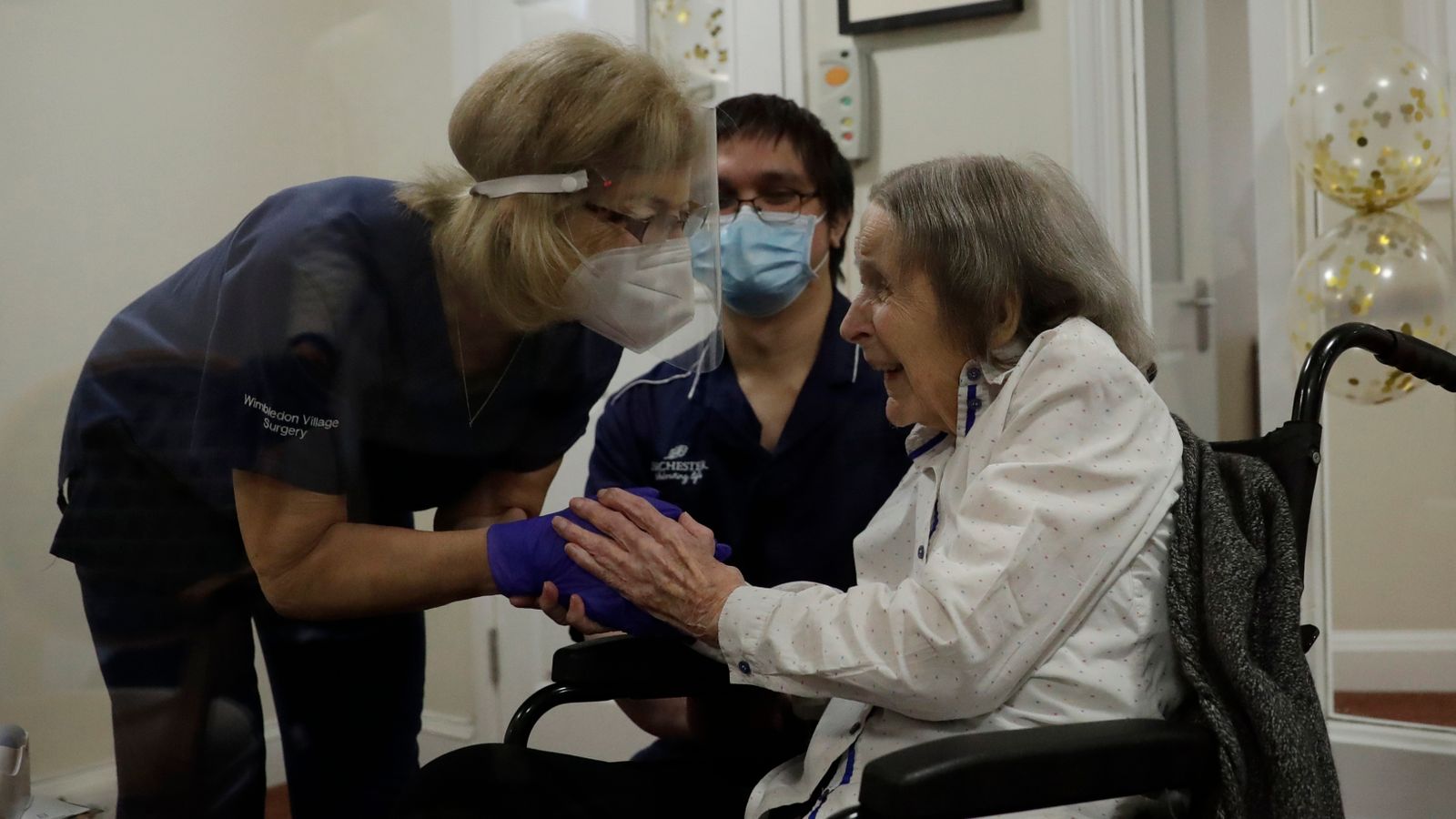Coronavirus vaccinations will be made compulsory for care home staff, Matt Hancock has confirmed.
New legislation will mean from October, subject to parliamentary approval and a subsequent 16 week grace period, anyone working in a CQC-registered care home in England for residents requiring nursing or personal care must have two doses of a COVID-19 vaccine.
The rule will not apply to those who have a medical exemption.
The government is also consulting on implementing the same policy for NHS workers, Mr Hancock said.
The health secretary told MPs in the Commons on Wednesday: “After careful consultation we’ve decided to take this proposal forward to protect residents.
“The vast majority of staff in care homes are already vaccinated but not all, and we know that the vaccine not only protects you but protects those around you.
Live COVID updates from the UK and around the world
“Therefore we will be taking forward the measures to ensure the mandation as a condition of deployment for staff in care homes and we will consult on the same approach in the NHS in order to save lives and protect patients from disease.”
Mr Hancock added: “This is the right thing to do and a vitally important step to continue protecting care homes now and in the future. I’d urge anyone working in care homes to get their jab as soon as possible.”
The move comes as ministers look to reduce the spread of coronavirus in care homes and hospitals by staff who are infected as cases of the Delta variant are rising in the community.
“Care home residents will be better protected from death and serious illness” under the new policy, the Department of Health and Social Care (DHSC) said.
It will apply to all workers employed directly by the care home or care home provider (on a full-time or part-time basis), those employed by an agency and deployed by the care home, and volunteers deployed in the care home.
Those coming into care homes to do other work, for example healthcare workers, tradespeople, hairdressers and beauticians, and CQC inspectors will also have to follow the new regulations, unless they have a medical exemption, the department said.
There will be exceptions for visiting family and friends, under 18s, emergency services and people undertaking urgent maintenance work.
There have been more than 40,000 deaths involving COVID in care homes in England during the pandemic to date.
Concerns have been raised about the uptake of the vaccine from those working in the care sector, with the latest figures suggesting more than 50,000 carers remain unvaccinated.
Around 1.5 million people work in social care in England.
Latest NHS figures, up to 6 June, show that 84% of staff in older adult care homes in England have had one jab, while almost 69% have two doses.
But in the east London borough of Hackney, for example, only 66.7% of staff in older adult care homes have received their first inoculation, while 58.6% have had two jabs.
Minister for Care Helen Whately said: “People working in care homes have played an incredibly important role throughout the pandemic caring for those most at risk from this terrible virus.
“The vaccine is working, with over 14,000 lives saved so far. It’s only right that we take every possible step to protect those most at risk now and in the long term.
According to research published last month by the London School of Hygiene & Tropical Medicine, black African and mixed black African staff are almost twice as likely to decline a jab as white British and white Irish participants.
Please use Chrome browser for a more accessible video player
Reasons cited include concerns about a lack of research and distrust in the vaccines, healthcare providers, and policymakers.
Providers and representatives from the care sector are understood to have met officials from the Department of Health and Social Care at midday on Wednesday to discuss the issue.
Under the proposals, care home workers will have 16 weeks to take up the offer of the jab or face losing their roles.
But the policy change is likely to prove controversial.
Some legal experts have previously suggested that compulsory vaccination could be challenged as a breach of European human rights law or equalities legislation.
The GMB union has claimed that more than a third of carers would consider quitting if vaccinations become compulsory.
Please use Chrome browser for a more accessible video player
Dr Susan Hopkins, strategic response director for COVID-19 at Public Health England, said there are “pros and cons to any debate on mandatory vaccination”, telling MPs that one downside could be that “people may vote with their feet, and not want to have the vaccine, and therefore not work in a care home, and that could lead to staff supply issues in care homes”.
She told the Science and Technology Committee: “I will remain a little bit concerned that we will have shortages of care staff once the mandate has come in, but I’m sure that the vast majority of care workers do want to do the right thing and get vaccinated to protect the elderly under their care.”
Mike Padgham, chairman of the Independent Care Group (ICG) which represents care homes in Yorkshire, said recruitment was “always challenging” before coronavirus hit and “is becoming more critical now”.
“If this goes ahead and is compulsory then I think it will put people off coming into the service. That’s one problem,” he said.
“The second problem is people who are already working in the service who might not want the vaccine. We are so stretched for frontline staff.
“It sounds easy to redeploy them but it isn’t easy to replace them when you redeploy them. And I think people will be put off.”






















